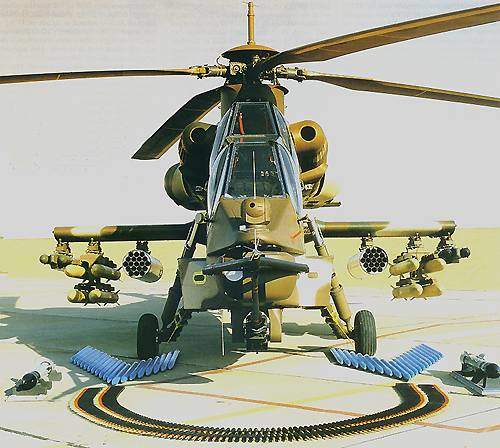The Rooivalk is a latest-generation attack helicopter from Denel Aviation of South Africa. The South African Air Force ordered 12 Rooivalk AH-2As, the first of which entered service in July 1999. The helicopters form part of No. 16 Squadron at Bloemspruit Air Force Base (near Bloemfontein).
The helicopters have been delivered and were to be fitted with the Mokopa ZT-6 anti-tank missile. A production order for the Mokopa was placed in March 2004. Delays with the development of the missile meant significant delays in integrating with the Rooivalk.
In May 2007 Denel Group announced they would cease development for the Rooivalk, however in November 2007 the South African government announced they would invest R962m ($137m) in the Rooivalk to bring it up to operational status by 2011.
In April 2011 the South African Air Force received five Block 1F upgraded Rooivalks which enabled the Mokopa integration.
Rooivalk attack helicopter cockpit
The cockpits are in stepped tandem configuration. The weapon systems officer (WSO) is seated in the front cockpit and the pilot is seated in the cockpit above and behind the WSO. The cockpits, which are fitted with crashworthy seats and are armour-protected, are equipped with hands-on collective And stick (HOCAS) controls.
A Thales Avionics TopOwl helmet-mounted sight display (HMSD) provides the crew with a head-up display of information for nap-of-the-earth flight (NOE). TopOwl incorporates an integrated measurement system for directing an articulated weapon such as the cannon, or air-to-air missile seeker heads. It has an integrated Gen IV image intensifier and FLIR capability and provides transition from day to night use at the push of a button.
The Rooivalk has a crash-resistant structure and is designed for stealth with low radar, visual, infrared and acoustic signatures.
Weapons
The Rooivalk carries a comprehensive range of weaponry selected for the mission requirement, ranging from anti-armour and anti-helicopter missions to ground suppression and ferry missions. The aircraft can engage multiple targets at short and long range, utilising the nose-mounted cannon and a range of underwing-mounted munitions.
The 20mm, F2 dual-feed, gas-operated cannon fires high-speed (1,100m/s) ammunition at a firing rate of 740 rounds a minute. Two ammunition bins hold up to 700 rounds of ready-to-fire ammunition. The slew rate of the cannon is 90° a second. The cannon is chin-mounted on the helicopter.
The Rooivalk was to be armed with the Mokopa long-range anti-armour missile developed by the Kentron Division of Denel. Mokopa has a semi-active laser seeker head and is equipped with a tandem warhead. Range is over 8.5km. Rooivalk can also fire Hellfire or HOT 3 missiles.
Rooivalk can carry four air-to-air missiles such as the Denel Aerospace Systems V3C Darter or MBDA (formerly Matra BAe Dynamics) Mistral.
The V3C Darter has an infrared seeker and a helmet-mounted sight for target designation. The Mistral, which has been selected by the South African Air Force, has an infrared seeker and range of up to 6km.
Rooivalk is equipped to fire 70mm folding-fin aerial rockets (FFAR), from the company Forges de Zeebrugge of Belgium, with a range of warheads, selectable according to the type of targets being engaged.
Rooivalk electronic warfare suite
The Rooivalk’s electronic warfare suite is the fully integrated helicopter electronic warfare self-protection suite (HEWSPS), incorporating radar warning, laser warning and countermeasures dispensing system. The system is flight-line programmable and in-flight adaptable to match the threat library with the mission’s area of operation.
The radar warner features low-effective radiated power (ERP) / pulse Doppler radar detection beyond radar detection range, ultra broadband frequency coverage, high pulse density handling and internal instantaneous frequency measurement.
The laser warner provides broadband laser frequency coverage to detect and display rangefinding, designating and missile guidance laser threats.
The countermeasures dispensing system, which is operated in manual, semi-automatic or fully automatic mode, is charged with chaff and flare cartridges.
Fire control and observation
Target detection, acquisition and tracking are carried out using the nose-mounted stabilised sight, TDATS. The TDATS sight is equipped with a low-level television sensor, Forward-looking infrared (FLIR), autotracker, laser rangefinder and laser designator.
Navigation and communications
The Rooivalk is equipped with an advanced navigation suite including Doppler radar velocity sensor, Thales Avionics eight-channel global positioning system, heading sensor unit and an air data unit.
The communications suite consists of two VHF/UHF transceivers with FM, AM and digital speech processing, one HF radio with frequency hopping and secure voice and data channels, and an IFF transponder.









